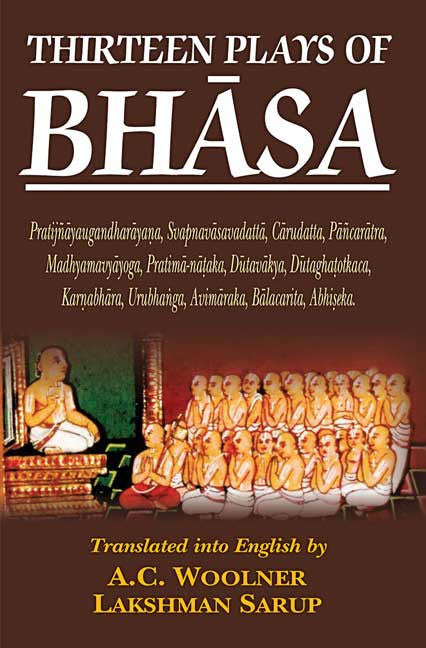Thirteen Plays of Bhasa: Pratijnayaugandharayana, Svapnavasavadatta, Carudatta, Pancaratra, Madhyamavyayoga, Pratima-nataka, Dutavakya, Dutaghatotkaca, Karnabhara, Urubhanga, Avimaraka, Balacarita, Abhiseka
Thirteen Plays of Bhasa: Pratijnayaugandharayana, Svapnavasavadatta, Carudatta, Pancaratra, Madhyamavyayoga, Pratima-nataka, Dutavakya, Dutaghatotkaca, Karnabhara, Urubhanga, Avimaraka, Balacarita, Abhiseka - Paperback is backordered and will ship as soon as it is back in stock.

Thirteen Plays of Bhasa: Pratijnayaugandharayana, Svapnavasavadatta, Carudatta, Pancaratra, Madhyamavyayoga, Pratima-nataka, Dutavakya, Dutaghatotkaca, Karnabhara, Urubhanga, Avimaraka, Balacarita, Abhiseka - Paperback is backordered and will ship as soon as it is back in stock.
This translation is of thirteen Sanskrit plays discovered in South India by the late Pandit Ganapati Sastri and edited by him in the Trivandrum Sanskrit Series. It comprises the following titles: 1.Pratijnayaugandharayana, 2.Svapnavasavadatta, 3.Carudatta, 4.Pancaratra, 5.Madhyamavyayoga, 6.Pratima-nataka, 7.Dutavakya, 8.Dutaghatotkaca, 9.Karnabhara, 10.Urubhanga, 11.Avimaraka, 12.Balacarita, and 13.Abhiseka. Sastri attributed all the thirteen plays to Bhasa and the prevailing opinion of the scholars is in agreement with him, though the available evidence is not conclusive and so the question still remains open. The translation was done by two eminent Sanskrit scholars. It was published s early as 1930 and a reprint is now issued in view of a presistent demand of scholars.
Pandit Ganapati Sastri attributed all thirteen plays to Bhasa, a famour dramatist earlier than Kalidasa. Some verses are ascribed to Bhasa by medieval anthologies, but only ten with unanimity. We are told that he composed a Svapnavasavadattam (his best play), and that in another play the device of the wooden elephant was used. Characteristic features of his work are described by Bana, and other poets evidently held him in high estimation. One or two verses from his plays are quoted by writers on poetics. Otherwise the text of BhasaÃs numerous plays had completely disappeared. The learned editor of the Trivandrum plays found that they contained a Svapnavasavadattam (the best play in the collection), and, in the Pratijna-Yaugandharayanam, a scene dealing with the wooden elephant. He noticed also certain peculiarities in the technique of the plays which he regarded as signs of antiquity. All these points confirmed him in the opinion that Bhasa was the author.
-
Pages
-
Edition
-
Size
-
Condition
-
Language
-
Weight (kg)
-
Publication Year
-
Country of Origin
-
Territorial Rights
-
Reading Age
-
HSN Code
-
Publisher




